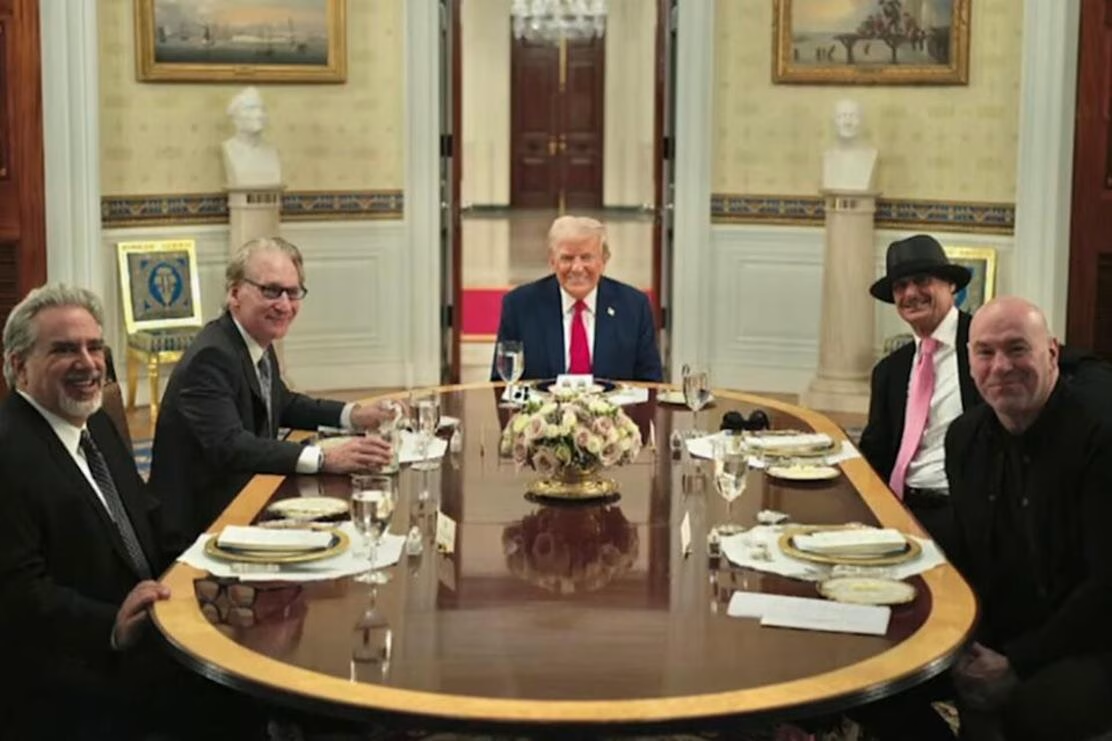By Ben Emos & Don Terry | Saturday, April 12, 2025 | 7 min read
In a moment that felt straight out of medieval history, comedian Bill Maher recently paid a visit to the White House, accompanied by his friend Kid Rock. The two were seen mingling with none other than Donald Trump. While the visit appeared to be a social occasion, there was an unmistakable undertone—one that recalled the role of jesters in royal courts. Historically, jesters were more than just entertainers; they were the voices that could laugh at the king while still getting close enough to influence his mood. In this case, Maher’s presence seemed to serve as a subtle attempt to soothe, distract, or perhaps even probe the mind of a leader whose grip on reality has been increasingly in question.
On his show, Maher tried to deflect criticism of his White House visit, especially at a time when Trump’s tariff policies are wreaking havoc across the globe, and his bizarre ambitions—like trying to buy Greenland and turn Canada into the 51st state—are raising eyebrows. Maher defended his actions, but his reasoning didn’t quite add up. It’s possible he didn’t even fully realize that he had been lured into playing the role of the jester. Whether or not he embraced it, the moment felt like an attempt to calm the storm in a chaotic political climate—a role that, consciously or not, Maher seemed to step into with ease.
A Jester’s Visit to Calm the King
In times of old, jesters were more than mere entertainers. These sharp-tongued figures had an uncanny ability to read the room and defuse volatile situations. They could dance on the fine line between mockery and mediation, using humor as a tool to ease the mood of irritable monarchs. Fast forward to the present, and Bill Maher’s entrance into the halls of the White House echoes this long-standing tradition.
For years, Maher has been a vocal critic of Trump, using his platform to lampoon the president’s erratic behavior and outsized ego. Yet this White House visit wasn’t about surrender or alliance; it was strategic. Maher’s presence likely served as a counterbalance to Trump’s well-documented temper, and perhaps even as a way to assess the president’s mental state up close. Like the jesters of old, Maher may have been tasked with gently softening the sharp edges of Trump’s volatile nature, offering him humor and a chance to laugh before his worst impulses took over.
Trump’s ally, Kid Rock, also had a role to play here, functioning as the go-between. In the ancient courts, jesters often needed an ally to gain access to powerful figures, and Kid Rock’s longstanding friendship with Trump likely facilitated this encounter. Together, they formed a trio that balanced entertainment with a delicate political mission.
The Jester’s Report: What Did Maher See?
If Maher’s visit had any deeper purpose than just socializing, it was likely for reconnaissance. Historically, jesters were often the only figures in a monarch’s inner circle who could see the ruler’s instability up close and offer an unfiltered view of his behavior to those outside the palace walls. In today’s world, Maher’s brand of satire is just as revealing. The question arises: What exactly did Maher witness behind the gilded doors of the White House—and how much of it will surface in his next monologue? He wasn’t there for the closed-door flattery sessions where cabinet members reportedly shower Trump with praise like he’s some kind of political deity. But Maher got close enough to witness the quieter performance—the curated calm, the illusion of control, a man trying to mask instability not with bluster, but with eerie composure. Whether he chooses to tell us what he really saw or wrap it in a punchline, one thing’s for sure: when the court jester walks out of the castle, the jokes start writing themselves.
One surreal moment he has shared speaks volumes: Maher handed Trump a printout of the worst things Trump had ever said about him—and Trump, in true showman fashion, signed it with a grin. The same man who once branded Maher a “third-rate comedian” and threatened to sue him over a birther joke now autographed those very insults as if they were collector’s items.
It wasn’t just absurd—it was revealing. A moment of Trumpian bravado, where ego outpaced memory and performance overtook pride. For Maher, the exchange was less about flattery and more about satire: the court jester getting the king to unwittingly endorse his own farce.
It was a surreal handshake between insult and ego—Maher, the lifelong Trump critic, getting the former president to co-sign his own vitriol. Whether Trump realized the irony is another question entirely. But Maher did. He knew exactly what he was doing: playing the jester to a king who doesn’t recognize satire even when it’s signed in Sharpie.
The Delicate Dance: Mockery Without Martyrdom
Trump, like many authoritarian figures before him, tolerates mockery only when it is on his terms. He’s happy to laugh at Maher’s jokes when they’re delivered in person but becomes livid when they are aired publicly. This dynamic between the monarch and the fool is a well-worn trope: the jester can mock, but only within the confines of the royal court. Outside of it, they risk being punished.
For Maher, this is a high-risk, high-reward game. The most famous jesters in history were those who could entertain without overstepping, without becoming the target of the king’s ire. Will Maher’s White House visit earn him some goodwill, or will Trump lash out at him the next time his comedy show takes aim at the president’s rambling speeches and incoherent rhetoric?
Why This Jester’s Role Matters More Than Ever
With increasing questions surrounding Trump’s mental fitness—evidenced by his erratic speeches, moments of confusion, and increasingly authoritarian rhetoric—the role of the jester has never been more significant. Maher’s visit to the White House underscores a vital point: in times of political instability and personal unraveling, humor becomes a tool of both truth-telling and resistance.
As the trade war has already wiped out up to $6 trillion in global market value, the nation may find itself in greater need of jesters than generals. When a leader begins losing touch with reality, humor becomes a critical tool to confront the deepening crises. Laughter, a time-tested weapon against tyranny, cuts through the noise, exposing the absurdities of power. It doesn’t just reflect a leader’s instability—it acts as a check on their unchecked authority. In times of turmoil, it’s the sharpness and wit of the jester that can hold a ruler accountable, especially when political systems seem to falter.
In a moment of uncertainty, we may find ourselves turning not to politicians, but to the comedic jester—one who speaks truth to power through humor, offering the kind of sharp clarity that can only come from the most unlikely of sources. As Bill Maher continues to navigate this perilous political landscape, we can only wonder if the king is listening or if the fool will become the next casualty of a power that has already shown itself to be both fragile and dangerous.
Long live the jester—may he keep the king in check just a little longer.
Copyright 2025 FN, NewsRoom.





